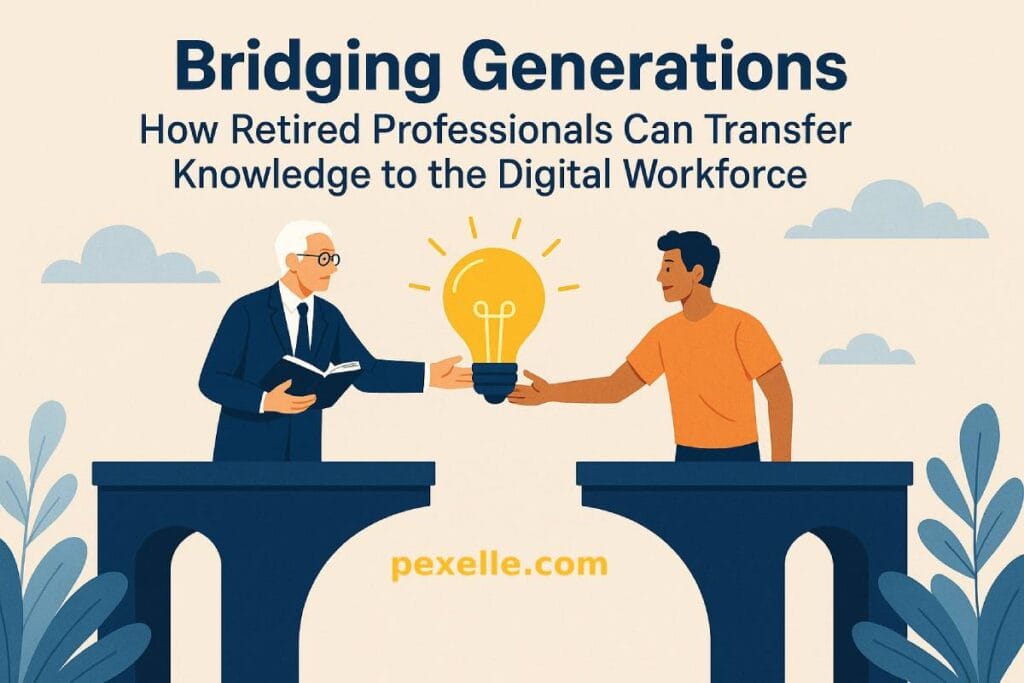Bridging Generations: How Retired Professionals Can Transfer Knowledge to the Digital Workforce

As the global workforce undergoes rapid digital transformation, one invaluable resource often overlooked is the deep well of experience held by retired professionals. These individuals carry decades of practical wisdom, domain-specific knowledge, and lessons from real-world problem-solving. The challenge—and opportunity—lies in transferring this wealth of insight to a generation raised in an era of automation, AI, and remote collaboration. This article explores the methods, challenges, and opportunities for enabling effective intergenerational knowledge transfer in the modern workplace.
The Value of Retirees’ Knowledge in a Digital World
Retired professionals possess what is known as tacit knowledge—the kind that is hard to write down or codify but is essential for decision-making, judgment, leadership, and intuition. While younger generations may have greater fluency in digital tools and agile methodologies, they often lack the lived experience that comes from decades in the field.
If captured and transferred correctly, retirees’ insights can:
- Prevent organizations from “reinventing the wheel.”
- Serve as case studies for strategic decision-making.
- Act as mentoring blueprints in fields like medicine, engineering, education, and management.
- Preserve institutional memory and organizational culture.
Mechanisms of Knowledge Transfer
There are several methods by which retirees can engage in meaningful knowledge transfer to younger professionals in the digital ecosystem:
- Virtual Mentorship Programs
Online mentorship platforms allow retirees to advise individuals or teams remotely. Scheduled sessions, recorded webinars, or open Q&A formats can be utilized. - Knowledge Capture Systems
Companies can use AI-enhanced documentation tools or structured interviews to extract key stories, decisions, and workflows from retired experts. - Intergenerational Innovation Labs
Hybrid teams consisting of retirees and digital-native professionals can work together on solving current problems using complementary strengths. - Part-Time Advisory Roles
Retired experts can be brought in as consultants or board members on flexible contracts, contributing insight without full-time commitment. - Digital Content Creation
Blogs, podcasts, e-books, or even AI-assisted video avatars can be used by retirees to chronicle their experience for wider access.
Challenges in Bridging the Generational Gap
Despite the potential, several obstacles hinder effective knowledge transfer:
- Technological Literacy Gaps
Many retirees may not be comfortable with digital tools used by the modern workforce, creating friction in communication. - Cultural and Communication Barriers
Generational differences in communication styles, values, and expectations can lead to misunderstandings or lack of mutual respect. - Time Constraints
Retirees may not have the willingness or availability to engage in long-term mentorship without flexible models. - Organizational Resistance
Some companies prioritize speed and innovation over experience and may undervalue the contributions of older professionals.
Opportunities for the Future
Despite the challenges, organizations and societies that invest in structured intergenerational knowledge sharing stand to benefit greatly. Some promising developments include:
- AI and NLP Tools that help transcribe and structure oral knowledge from retirees into searchable digital libraries.
- Reverse Mentoring Programs, where younger employees teach digital tools in exchange for mentorship on leadership or industry trends.
- Government Incentives for senior workforce engagement, especially in public sectors like healthcare, infrastructure, and education.
Conclusion
Retired professionals represent a rich and often untapped source of strategic knowledge. As the digital economy continues to evolve, the transfer of this experience to the younger workforce is not only desirable—it is essential. By leveraging technology, creating inclusive organizational cultures, and building platforms for structured engagement, we can turn the retirement phase into a golden bridge that connects the wisdom of the past with the innovation of the future.
Source : Medium.com




